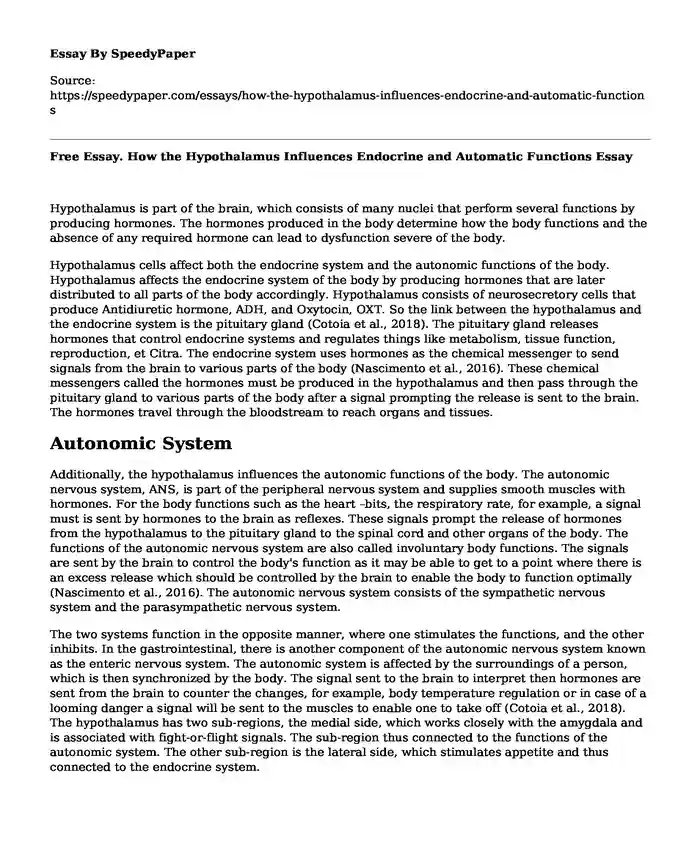
| Essay type: | Definition essays |
| Categories: | Knowledge Biology Medicine Anatomy |
| Pages: | 3 |
| Wordcount: | 692 words |
Hypothalamus is part of the brain, which consists of many nuclei that perform several functions by producing hormones. The hormones produced in the body determine how the body functions and the absence of any required hormone can lead to dysfunction severe of the body.
Hypothalamus cells affect both the endocrine system and the autonomic functions of the body. Hypothalamus affects the endocrine system of the body by producing hormones that are later distributed to all parts of the body accordingly. Hypothalamus consists of neurosecretory cells that produce Antidiuretic hormone, ADH, and Oxytocin, OXT. So the link between the hypothalamus and the endocrine system is the pituitary gland (Cotoia et al., 2018). The pituitary gland releases hormones that control endocrine systems and regulates things like metabolism, tissue function, reproduction, et Citra. The endocrine system uses hormones as the chemical messenger to send signals from the brain to various parts of the body (Nascimento et al., 2016). These chemical messengers called the hormones must be produced in the hypothalamus and then pass through the pituitary gland to various parts of the body after a signal prompting the release is sent to the brain. The hormones travel through the bloodstream to reach organs and tissues.
Autonomic System
Additionally, the hypothalamus influences the autonomic functions of the body. The autonomic nervous system, ANS, is part of the peripheral nervous system and supplies smooth muscles with hormones. For the body functions such as the heart –bits, the respiratory rate, for example, a signal must is sent by hormones to the brain as reflexes. These signals prompt the release of hormones from the hypothalamus to the pituitary gland to the spinal cord and other organs of the body. The functions of the autonomic nervous system are also called involuntary body functions. The signals are sent by the brain to control the body's function as it may be able to get to a point where there is an excess release which should be controlled by the brain to enable the body to function optimally (Nascimento et al., 2016). The autonomic nervous system consists of the sympathetic nervous system and the parasympathetic nervous system.
The two systems function in the opposite manner, where one stimulates the functions, and the other inhibits. In the gastrointestinal, there is another component of the autonomic nervous system known as the enteric nervous system. The autonomic system is affected by the surroundings of a person, which is then synchronized by the body. The signal sent to the brain to interpret then hormones are sent from the brain to counter the changes, for example, body temperature regulation or in case of a looming danger a signal will be sent to the muscles to enable one to take off (Cotoia et al., 2018). The hypothalamus has two sub-regions, the medial side, which works closely with the amygdala and is associated with fight-or-flight signals. The sub-region thus connected to the functions of the autonomic system. The other sub-region is the lateral side, which stimulates appetite and thus connected to the endocrine system.
Relation of Hypothalamus to Sleep and Wakefulness
Also, the hypothalamus regulates wakefulness and sleep in our bodies. Hypothalamus has a suprachiasmatic nucleus that connects to light-sensitive regions (Nascimento et al., 2016). The light-sensitive areas then prepare the body to sleep during the night and awake during the day. A chemical called histamine is released from the tuberomammillary nucleus that enables the brain and the entire body to be alert during the day. In medicine, this function of the hypothalamus is utilized by doctors in developing antihistamine drugs. The chemical is released more during the day with the aid of light-sensitive cells in the brain (Cotoia et al., 2018).
References
Cotoia, A., Dibello, F., Moscatelli, F., Sciusco, A., Polito, P., Modolo, A., & Cinnella, G. (2018). Effects of Tibetan music on neuroendocrine and autonomic functions in patients waiting for surgery: a randomized, controlled study. Anesthesiology research and practice, 2018.
https://www.hindawi.com/journals/arp/2018/9683780/Nascimento, L. F., Souza, G. F., Morari, J., Barbosa, G. O., Solon, C., Moura, R. F., ... & Velloso, L. A. (2016). n-3 fatty acids induce neurogenesis of predominantly POMC-expressing cells in the hypothalamus. Diabetes, 65(3), 673-686.
https://diabetes.diabetesjournals.org/content/65/3/673.short
Cite this page
Free Essay. How the Hypothalamus Influences Endocrine and Automatic Functions. (2023, Aug 01). Retrieved from https://speedypaper.com/essays/how-the-hypothalamus-influences-endocrine-and-automatic-functions
Request Removal
If you are the original author of this essay and no longer wish to have it published on the SpeedyPaper website, please click below to request its removal:
- Comparison Essay Sample on Two Educational Systems
- Performance-Enhancing Drugs in Sports, Essay Sample for Free
- Good Representative - Essay Example
- Problems in Usage of FIOA - Essay Sample for You
- Essay Sample on Learning Disabilities in Education: Auditory Processing Disorder
- Paper Example. The Health Conditions of the Married and Unmarried People
- Caring for COPD Dementia Patients - Essay Example
Popular categories




